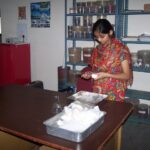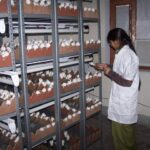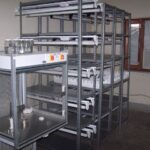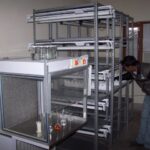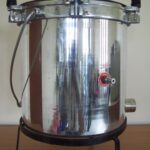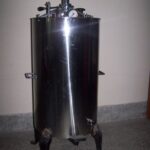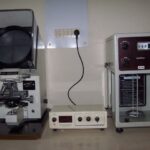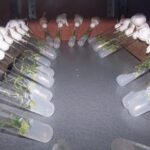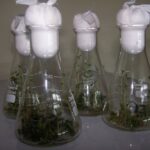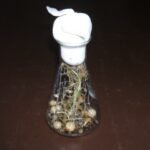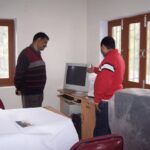IN VITRO MICRO TUBER SEED PRODUCTION OF POTATO
IN VITRO MICRO TUBER SEED PRODUCTION OF POTATO CV. KUFRI HIMALINI FOR COMMERCIAL CULTIVATION IN HILLY REGIONS OF UTTARAKHAND
INTRODUCTION AND BACKGROUND OF THE PROJECT
Potato (Solanum tuberosum) is a staple food crop widely cultivated around the world due to its high nutritional value and versatility. In India, potato is the second most important vegetable crop after tomato and is grown in almost every state. However, the cultivation of potato is facing challenges in the hilly regions of Uttarakhand due to the unavailability of suitable planting material, which is crucial for successful crop production. The conventional method of potato seed production is through the use of tubers, which is highly dependent on the climatic conditions of the region. In hilly regions, where the climate is unpredictable, the production of potato seeds through tubers is highly unreliable. This results in low crop yield and poor quality of potato tubers. Therefore, there is a need to develop an alternative method of potato seed production that is not dependent on climatic conditions and can ensure high-quality planting material for potato cultivation in the hilly regions of Uttarakhand.
In vitro micro-tuber seed production is one such alternative method of potato seed production that has gained popularity in recent years. It involves the production of miniature tubers in a controlled environment using tissue culture techniques. This method is not dependent on climatic conditions and can produce high-quality planting material that is free from diseases and pests. The aim of this project is to develop a protocol for in vitro micro-tuber seed production of potato cv. Kufri Himalini, which is a popular variety of potato grown in the hilly regions of Uttarakhand. The developed protocol will be optimized for commercial scale production of high-quality planting material that can be used by farmers in the region. This project has the potential to revolutionize potato cultivation in the hilly regions of Uttarakhand and ensure food security for the region.
AIMS AND OBJECTIVES OF THE PROJECT
1. Devise innovative methodologies to generate disease-free potato planting material, placing a premium on both quality and uniformity.
2. Undertake research efforts to explore and subsequently apply novel propagation techniques with the aim of minimizing production expenses related to potato planting material.
3. Incorporate the introduction of micro tubers as an alternative propagation approach, actively advocating for their utilization to attain disease-free planting material.
4. Enhance the overall calibre of potato planting material, furnishing farmers with seed material that is characterized by high quality and a complete absence of diseases.
5. Promote the widespread adoption of micro tubers for potato propagation by spearheading awareness campaigns highlighting their inherent benefits and advantages.
COMPONENTS AND ACTIVITIES OF THE PROJECT
1. Source authentic tubers of the targeted potato variety, such as Kufri Himalini, distinguished for its favorable attributes.
2. Cultivate mother plants in a controlled environment, notably within a poly house, to establish ideal growth conditions and mitigate potential disease vulnerabilities.
3. Carefully choose disease-free explants from well-established mother plants, prepare appropriate growth substrates, sterilize explants, and initiate growth in the prepared mediums.
4. Closely monitor the growth progress of cultured explants across various substrates, making comparative assessments of growth parameters encompassing rate, vigor, and overall health.
5. Gradually transition robustly established cultures to a liquid propagation medium, thus facilitating improved growth and facilitating assessment of micro tuber development.
6. Rigorously evaluate micro tuber growth characteristics, including dimensions, uniformity, quality, and disease resistance attributes.
7. Generate miniature tubers from the resultant micro tubers, subjecting them to a comprehensive assessment of growth parameters for quality and suitability in subsequent propagation endeavours.
8. Devise an enhanced potato propagation methodology, underscored by heightened efficiency, cost-effectiveness, and environmental compatibility, with a strategic emphasis on potential advantages for both farmers and relevant stakeholders.
TARGET AREA OF THE PROJECT
The project was confined to a distinct geographical scope, encompassing both the Ranichauri region and the Chamba-Mussoorie fruit belt within the Tehri Garhwal district of Uttarakhand. These areas were deliberately selected due to their pronounced importance in potato cultivation and production, particularly within hilly terrains.
TARGET GROUPS AND BENEFICIARIES OF THE PROJECT
The project’s intended beneficiaries were the forward-thinking farmers within the Ranichauri region and the Chamba-Mussoorie Fruit Belt, situated in the Tehri Garhwal district of Uttarakhand. These farmers were purposefully identified as they play a pivotal role in the potato cultivation sector and hold substantial potential to derive notable advantages from the project’s execution.
FUNDING PARTNER OF THE PROJECT
The funding for the project was provided by the Uttarakhand State Council for Science & Technology (UCOST), Department of Science & Technology, Government of Uttarakhand, Dehradun.
SANCTIONED BUDGET OF THE PROJECT
The project was sanctioned by the UCOST in the year 2007 for a period of 2 years with a specified budget, as detailed below:
| Financial Year | Sanction Order/Work Order/Agreement No. | Date of Sanction Order/Work Order/Agreement |
Sanctioned Budget of the Project (Amount in Rs.) |
| 2006-07 | UCS&T/R&D/LS-32/06-07/ 1062 | 06.03.2007 | 3,39,000.00 |
| 2008-09 | UCS&T/R&D/LS-32/08-09/ 4091 | 04.08.2008 | 1.09,500.00 |
| 2008-09 | UCS&T/R&D/LS-32/06-07/4915 | 19.01.2009 | 1.09,500.00 |
| Total | 5,58,000.00 |
OUTCOMES AND ACHIEVEMENTS OF THE PROJECT
The In Vitro Micro Tuber Seed Production of Potato Project has been successful in achieving its objectives, and the following outcomes and achievements have been accomplished:
1. The project has successfully generated disease-free potato planting material by adopting an innovative approach involving the production of micro tubers as an alternative to conventional propagation techniques.
2. A diverse range of growth mediums has been meticulously prepared, followed by the precise sterilization and establishment of explants within them.
3. An ongoing monitoring process has been implemented to assess the growth progress of the cultures, accompanied by a comprehensive comparison between various growth mediums.
4. The cultures have been transitioned to a liquid propagation medium, facilitating their continued growth and enabling a detailed assessment of micro tuber growth parameters.
5. Following the micro tuber phase, the project has successfully generated mini tubers and conducted a thorough evaluation of their growth parameters to ensure their quality and viability.
6. The project has incorporated authentic tubers of the potato variety “Kufri Himalini,” which have been systematically collected and integrated into the project’s endeavours.
7. An integral outcome of the project has been the substantial reduction in the production cost of potato planting material, which can be directly attributed to the successful development and implementation of the micro tuber methodology.
8. To support micro tuber production, dedicated mother plants have been cultivated within a controlled poly house environment, and the selection of suitable explants has been carried out with precision and care.
9. An integral hallmark of the project’s achievements is the creation of a highly efficient and economically viable method for propagating potatoes, which is not only economically advantageous but also environmentally sound, aligning with sustainable agricultural practices.
10. The revolutionary approach to potato propagation developed through this project is set to deliver multifaceted benefits to farmers, spanning economic empowerment, social well-being, and enhanced commercial viability, ultimately reshaping potato cultivation practices and creating a more prosperous and sustainable future for the agricultural community.


